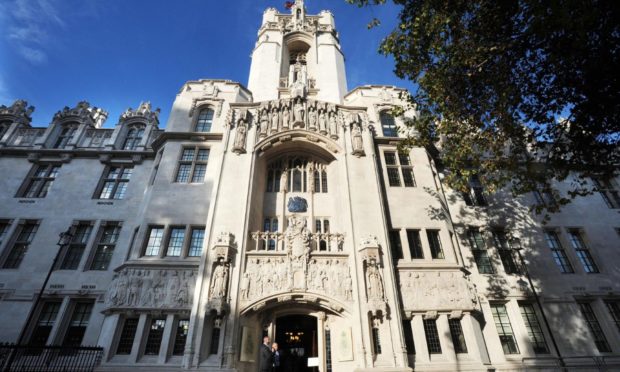A looming Supreme Court battle over Holyrood legislation has been described as a “technical argument” that will go “right to the heart of devolution”.
Legal experts highlighted the “tension” between the Westminster and Scottish parliaments after the UK Government asked the country’s highest court to determine whether MSPs acted within their rights when they passed two Bills last month.
The referral to the Supreme Court on Thursday triggered a major row, with First Minister Nicola Sturgeon branding it “jaw-dropping” and “morally repugnant”.
The UK Government insisted it was not about the “substance” of the legislation, which would enshrine the UN Convention on the Rights of the Child and the European Charter of Local Self-Government into Scots law.
Instead, it said the concern related to whether parts of the Bills were within the scope of Holyrood’s powers.
Limits of devolution in Scottish Parliament to be tested at Supreme Court #Constitution https://t.co/aN76LKOKem
— Dr Nick McKerrell (@DrNikLaw) April 12, 2021
Speaking on the BBC’s Good Morning Scotland radio programme, Nick McKerrell, a senior law lecturer at Glasgow Caledonian University, said: “In some ways it’s a technical argument, but it does go to the heart of devolution – which is the idea that we’ve got two parliaments that can pass laws for Scotland, and what the limits are for each one to do that.
“One of the areas that the Scottish Parliament aren’t allowed to go into is reserved matters, which is matters that only Westminster can pass laws about.
“This is a slightly more technical argument, because what this is saying is that the courts in Scotland shouldn’t be able to use these laws to limit the legislation coming from Westminster. So that is the tension.”
He added: “Although the UK Government are saying that they’ve got no problem with the laws on the rights of the child, or indeed the local government ones, what they don’t accept is that it goes into areas that Westminster could make laws on in the future.
“So if you like, they are saying the Scottish Parliament is trying to tell Westminster what it can’t make laws on, whereas the whole structure of devolution is the other way around.”
Mr McKerrell said he expected legal arguments to be made within the next month, or potentially after the election, before a ruling is made by the Supreme Court in late summer on whether the law is within the power of the Scottish Parliament.
The Supreme Court confirmed that no date had yet been set for the hearing.
Deputy First Minister John Swinney said the Scottish Government would “vigorously resist” the legal challenge.
A breathtaking decision by the U.K. Government to challenge, in Court, legislation agreed unanimously @ScotParl, to protect the rights of children. This is the real face of the Tories. We must put the rights of children first and @scotgov will vigorously resist this. https://t.co/i5nOh2KuVo
— John Swinney (@JohnSwinney) April 12, 2021
On social media, Glasgow University law professor James Chalmers said: “My tentative and unpopular view about this is that if the UK Government disputes the legislative competence of these Acts it probably ought to get that resolved (although there would, I suppose, be alternative ways of resolving that).
My tentative and unpopular view about this is that if the UK government disputes the legislative competence of these Acts it probably ought to get that resolved (although there would, I suppose, be alternative ways of resolving that). https://t.co/n4wGxWSsXu
— James Chalmers (@ProfChalmers) April 12, 2021
Christopher McCorkindale, from Strathclyde University, suggested on Twitter that the decision by the UK Government was “perhaps a sign of a more confident/assertive approach from the centre to devolution and the union”.
There are lots of interesting issues here but for starters – along with Janet Hiebert – we interviewed OAG lawyers about s33 references which at that point (not far from two decades into devo) had not been used. One reason was the political sensitivity of doing so with the SNP… https://t.co/gs72kqyJO3
— Chris McCorkindale (@chrismccork) April 12, 2021
..period in which a draft Referendum Bill is at the core of the SNP’s pitch for government. Alongside some other developments (eg the spending powers in the Internal Market Act) perhaps a sign of a more confident/assertive approach from the centre to devolution and the union.
— Chris McCorkindale (@chrismccork) April 12, 2021
Durham University public law and human rights professor Aileen McHarg and Edinburgh University lecturer Scott Wortley were among the experts saying the legal challenge was unlikely to spell the end of the two Bills, but it could mean delays and changes to their scope.
As previously threatened.
Neither Bill is likely to be wholly derailed, even if the UK Govt's challenges are successful, but they will be narrowed in scope, and of course their enactment delayed. https://t.co/bgFnmcOZpM
— Aileen McHarg (@AileenMcHarg) April 12, 2021
